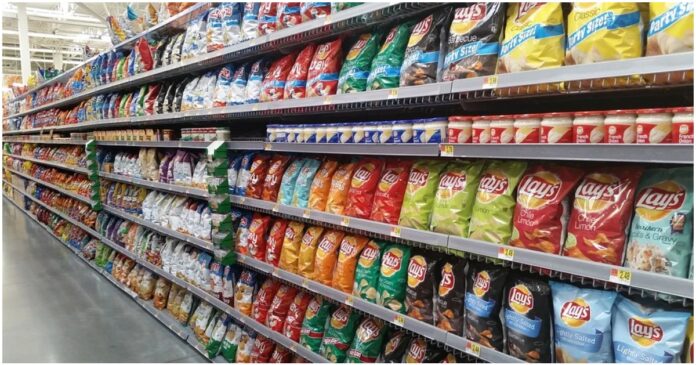An example of shrinkflation, what was once a 24-can box of Coca-Cola now holds 20 cans.
Americans are seeing the real costs of inflation in their daily lives as they pay record-high gas prices, significantly increased grocery costs, and suffer sticker shock at restaurants, hair salons and other places.
Restaurants are charging more, with some posting notices on their doors. Increased prices, they say, are necessary to stay open simply to cover their increased costs for cooking oil and other goods. Some restaurants post signs accompanying empty containers to show that while they’re not increasing prices, their portion sizes are smaller.
The Bureau of Labor Statistics reported that prices have increased by 7.9% in the past 12 months, since the start of President Joe Biden’s presidency. But the increased prices don’t take into account the fact that consumers also are paying more for less in another way: shrinkflation. The term points to how less of a product is sold at the same or an inflated cost.
Shrinkflation
Consumer World points to shrinkflation in its Mouse Print report, noting how products “have recently shrunk in size.”
By reading the fine print on bags of chips or the label on canned goods, consumers are noticing that what was previously 12 ounces is now 11.25 or less.
Consumers have been posting pictures of old and new products made by the same brand on social media sites. One popular page is Reddit’s “shrinkflation” page. Consumer World’s Mouse Print is similar.
For example, what was once a 24-can box of Coca-Cola now holds 20 cans.
“Coffee’s getting smaller,” another user posted, along with pictures of an older 100g tin of Nescafe Azera compared to its new new 90g tin.
Those still heading to the gym for a workout may notice their Gatorade bottles have lost weight. Their new hourglass figure is 28 oz. The drink has long been available in 32 oz. plastic bottles. By charging the same price for less, consumers are paying 14% more.
SUN-MAID raisins have the same package and cost the same amount but have 13% fewer raisins, a Reddit consumer points out.
“Aldi Mandarin oranges price up and calories down,” writes another who posted a picture of older cans next to a newer can with the same serving sizes listed on their labels. But the older can’s serving size is 90 calories; the new can’s is 70.
“Hidden Inflation?” another user asked, posting a picture of two Dove soap bars. “Purchased in 2020 (left) & 2021 (right),” they wrote, pointing to a 4 oz. bar of soap on the left and a 3.75 oz. bar on the right.
Other popular posts are of Keebler’s repackaged products. Its Chips Deluxe with M&Ms, for example, was previously 11.3 oz. Now, it’s 9.75 oz. Its E.L. Fudge packages also lost 1.3 ounces and 20 calories per cookie, consumers note.
“Inflation is hitting everyone … we took just a little bit out of the bag so we can give you the same price and you can keep enjoying your chips,” Frito-Lay said of shrinking its Doritos bags, Quartz reported.
But it’s not the same “price,” because consumers are effectively paying more for fewer chips.
“One of the most puzzling reductions is ‘Family Size’ boxes of products,” Quartz states.
While the average size of an American family has increased according to U.S. Census Bureau data, family-sized packaging of some foods is smaller, it notes.
“A box of original Wheat Thins used to be sold in Family Size 16 oz. boxes and is now packaged as 14 oz. at the same price. That’s a 14% price increase. The reduced fat version of Family Size followed, going from 14.5 oz. to 12.5 oz. – a 16% price increase,” Quartz reports.
For those rushing out to get toilet paper, they may want to check the fine print as well. “Over the past 60 years we’ve seen Charmin toilet paper go from 650 single-ply sheets on a roll to the equivalent of 90% … assuming you could even find single rolls any longer,” Mouse Print states. “The latest change shows ultra soft ‘Mega’ rolls going from 264 double-ply sheets per roll to 244. And ‘Super Mega’ rolls went from 396 sheets to 366.”
Shampoo and conditioner bottles are also coming out with new shapes – and less product. They usually held 12 oz., now they hold 10.4 oz. or less.
While selling less of a product for the same amount of money isn’t illegal, it has resulted in lawsuits, Quartz notes. In 2021, McCormick paid $2.5 million to resolve claims made by customers after it sold less black pepper in the same-sized containers; Mondelez was sued over how it changed its Toblerone candy bars.
It is illegal, however, for labels to be inaccurate.
Americans “have the right to expect that the information on the label, including the ingredient list, is accurate,” the FDA states.
The Federal Food, Drug and Cosmetic Act – which provides authority for FDA’s consumer-protection work – requires that labels on packaged food products in interstate commerce not be false or misleading in any way.
The FDA monitors food products to ensure that labels are truthful and not misleading. If products aren’t labeled according to the law, the FDA “takes appropriate action.”
If consumers suspect a label is inaccurate, they are encouraged to contact the FDA’s Consumer Complaint coordinator for the state/region in which they live.
Bethany Blankley | The Center Square contributor
Go to Source
Reposted with permission
Table of Contents
































